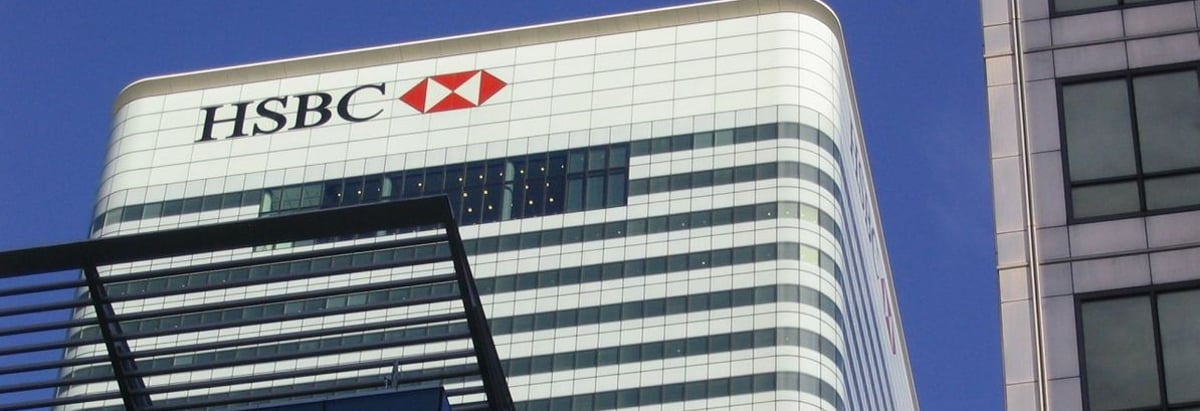Stock Analysis
- United Kingdom
- /
- Banks
- /
- LSE:HSBA
Be Sure To Check Out HSBC Holdings plc (LON:HSBA) Before It Goes Ex-Dividend

It looks like HSBC Holdings plc (LON:HSBA) is about to go ex-dividend in the next four days. The ex-dividend date is usually set to be one business day before the record date which is the cut-off date on which you must be present on the company's books as a shareholder in order to receive the dividend. The ex-dividend date is of consequence because whenever a stock is bought or sold, the trade takes at least two business day to settle. Meaning, you will need to purchase HSBC Holdings' shares before the 9th of November to receive the dividend, which will be paid on the 21st of December.
The company's upcoming dividend is US$0.10 a share, following on from the last 12 months, when the company distributed a total of US$0.53 per share to shareholders. Last year's total dividend payments show that HSBC Holdings has a trailing yield of 7.1% on the current share price of £6.022. Dividends are a major contributor to investment returns for long term holders, but only if the dividend continues to be paid. So we need to check whether the dividend payments are covered, and if earnings are growing.
View our latest analysis for HSBC Holdings
Dividends are typically paid out of company income, so if a company pays out more than it earned, its dividend is usually at a higher risk of being cut. Fortunately HSBC Holdings's payout ratio is modest, at just 38% of profit.
Companies that pay out less in dividends than they earn in profits generally have more sustainable dividends. The lower the payout ratio, the more wiggle room the business has before it could be forced to cut the dividend.
Click here to see the company's payout ratio, plus analyst estimates of its future dividends.
Have Earnings And Dividends Been Growing?
Businesses with strong growth prospects usually make the best dividend payers, because it's easier to grow dividends when earnings per share are improving. Investors love dividends, so if earnings fall and the dividend is reduced, expect a stock to be sold off heavily at the same time. It's encouraging to see HSBC Holdings has grown its earnings rapidly, up 24% a year for the past five years.
The main way most investors will assess a company's dividend prospects is by checking the historical rate of dividend growth. Since the start of our data, seven years ago, HSBC Holdings has lifted its dividend by approximately 0.6% a year on average. It's good to see both earnings and the dividend have improved - although the former has been rising much quicker than the latter, possibly due to the company reinvesting more of its profits in growth.
Final Takeaway
Should investors buy HSBC Holdings for the upcoming dividend? Typically, companies that are growing rapidly and paying out a low fraction of earnings are keeping the profits for reinvestment in the business. This is one of the most attractive investment combinations under this analysis, as it can create substantial value for investors over the long run. Overall, HSBC Holdings looks like a promising dividend stock in this analysis, and we think it would be worth investigating further.
In light of that, while HSBC Holdings has an appealing dividend, it's worth knowing the risks involved with this stock. For instance, we've identified 2 warning signs for HSBC Holdings (1 shouldn't be ignored) you should be aware of.
If you're in the market for strong dividend payers, we recommend checking our selection of top dividend stocks.
Valuation is complex, but we're helping make it simple.
Find out whether HSBC Holdings is potentially over or undervalued by checking out our comprehensive analysis, which includes fair value estimates, risks and warnings, dividends, insider transactions and financial health.
View the Free AnalysisHave feedback on this article? Concerned about the content? Get in touch with us directly. Alternatively, email editorial-team (at) simplywallst.com.
This article by Simply Wall St is general in nature. We provide commentary based on historical data and analyst forecasts only using an unbiased methodology and our articles are not intended to be financial advice. It does not constitute a recommendation to buy or sell any stock, and does not take account of your objectives, or your financial situation. We aim to bring you long-term focused analysis driven by fundamental data. Note that our analysis may not factor in the latest price-sensitive company announcements or qualitative material. Simply Wall St has no position in any stocks mentioned.
About LSE:HSBA
HSBC Holdings
Provides banking and financial services worldwide.

